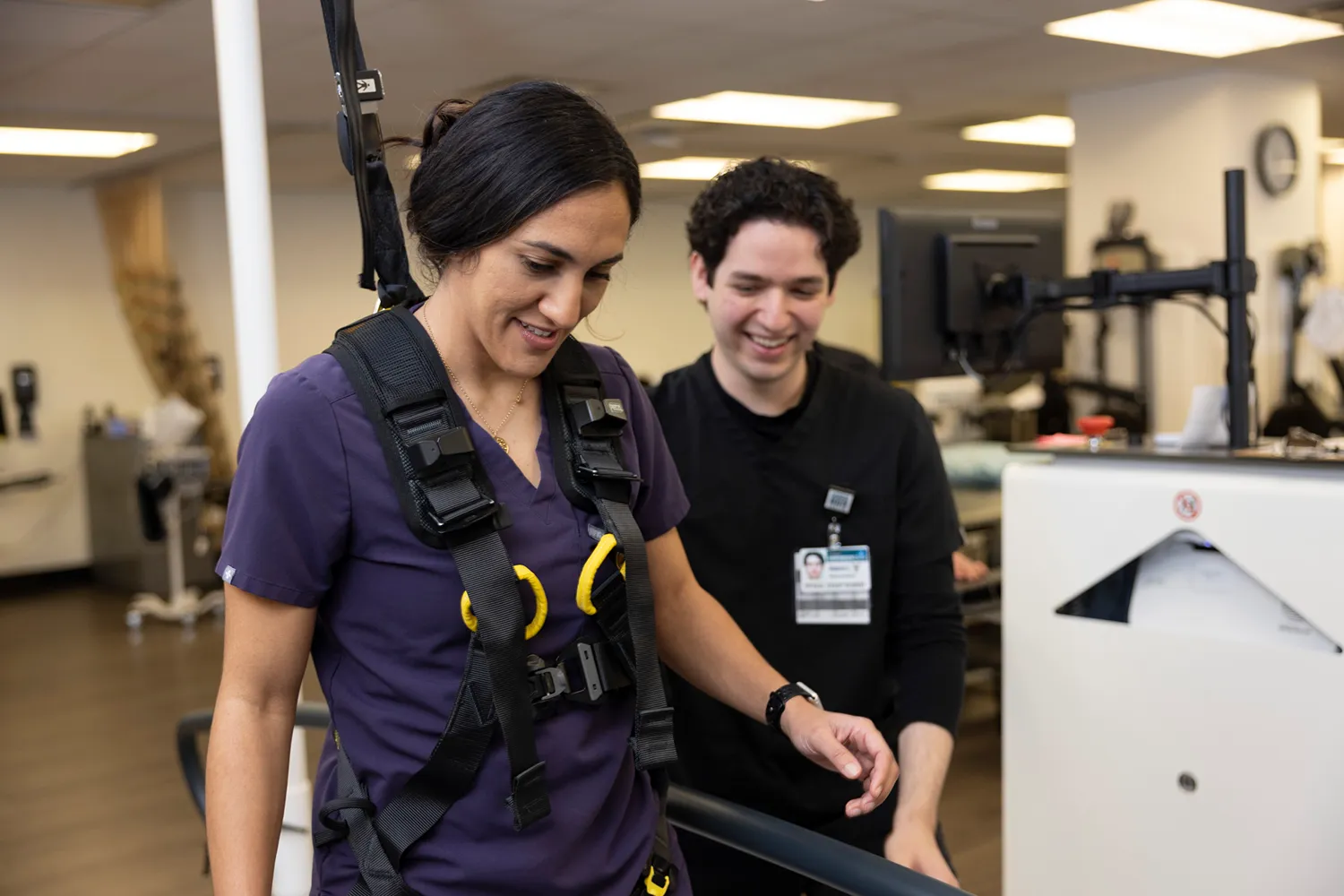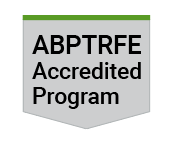PHYSICAL THERAPY RESIDENCY PROGRAM NEUROLOGIC PHYSICAL THERAPY

NEUROLOGIC PHYSICAL THERAPY RESIDENCY
The mission of the Harris Health Neurologic Physical Therapy Residency is to develop physical therapy professionals that will utilize advanced clinical skills, as well as demonstrate biopsychosocial sensitivity. Graduates will be leaders in directing a person’s plan of care across the continuum to achieve maximum outcomes for persons with neurologic dysfunction. Furthermore, the Residency seeks to graduate physical therapists that support the Harris Health Mission, Vision and Values while also embracing the APTA’s Vision to transform society by optimizing movement to improve the human experience.
What Sets Us Apart As A Residency Program:
- Housed within the nation’s largest medical center and part of the largest medical teaching facility.
- Residents, as full-time salaried employees, engage in focused didactic and clinical education from multiple board-certified physical therapists in a variety of clinical settings across the continuum of care.
- The diversity of settings allows the resident to gain advanced clinical knowledge, experience, and skills in neurologic physical therapy while training throughout the Harris Health and other specialty facilities within the Texas Medical Center including The Michael E. DeBakey VA Medical Center and Baylor Medicine at McNair Campus.
- Residents will be mentored by highly qualified clinicians, educators, and specialists in the management of complex and diverse diagnoses and will collaborate with other residents, healthcare providers, and administrators in both public and private systems.
- Extensive advanced credentials of teaching and mentoring faculty, including 13 NCS, 1 GCS, 1 PhD’s, and 1 DSc.
- Graduates of the Harris Health Neurologic Residency have gone on to become managers, clinic owners, assistant and adjunct university professors as well as residency faculty, and they have also served in local, state, and national appointed positions.
- Residents will get more than 150 hours of one-on-one mentorship along with more than 300 hours of classroom and lab instruction that augments daily practice in a dynamic, evidence-based setting.
- Residents lecture and provide lab sessions at our local DPT programs.
- Residents participate in a yearlong research or performance improvement project under the guidance of well qualified faculty. Their hard work culminates with the presentation of their work at the Capstone ceremony.
- Outcome Publication: 91% total pass rate on NCS exam. Completion rate is 100% for the past 5 years.
- Financials: There is no tuition cost or additional fees associated with our program.
The goals of Harris Health’s Neurologic Physical Therapy Residency Program are to:
- Be nationally recognized as a leader in residency training in physical therapy
- Graduate residents who contribute to the profession of physical therapy and the larger healthcare community through leadership, evidence-based practice, teaching and service.
- Graduate residents who will pursue board certification through the American Board of Physical Therapy Specialties (ABPTS) upon graduation.
COME VISIT US!
We highly encourage potential applicants to come visit with us to tour our facilities, meet our faculty and residents, and other residency events depending on availability. Contact the program director now to set up a date.
Frequently Asked Questions
Applying for a residency is a big life decision and there are many questions that need to be answered to make the right choice. Here are some frequently asked questions and answers to help you better understand Harris Health’s Neurologic residency program.
What are the admission requirements? When are applications due? When does the program start?
Applications are typically due at the end of January each year, please contact program director for up to date application deadline. Each cohort begins at the end of August or beginning of September.
How long is the residency?
The residency program is 54 weeks in duration.
What does the compensation package look like for residents?
The resident is a full-time employee of Harris Health and is paid 72% of an entry level staff therapist. Residents also are entitled to a full spectrum of exemplary benefits, including:
- Comprehensive Medical Plan/HMO and Major Medical
- Dental Insurance
- Vision Plan
- Pre-Tax Flex Accounts
- Basic Life Insurance
- Deferred Compensation Plans
- Professional Liability Insurance
-
Other benefits that our residents are entitled to:
- Paid Time off: Residents are granted over 30 days of PTO
- Hospital Business: Residents are encouraged to participate in professional conferences and events. Hospital business allows the residents to attend these events without taking from their PTO banks.
- There is no tuition cost for the residency program.
How is the curriculum structured?
The residency curriculum covers all requirements outlined in the Neurologic Physical Therapy Description of Specialty Practices. Our residents are exposed to practice settings throughout the entire continuum of care including rotations through the acute care/ICU, inpatient and outpatient rehabilitation settings, and specialty clinics within the Harris Health. We partner with VA Medical Center, Baylor Medicine at McNair Campus, and other facilities within the Texas Medical Center to ensure the resident has a complete experience to the management of neurologic diagnoses. For more specific curriculum questions, please email the neurologic program director.
Describe a typical work week
The majority of a resident’s work week is the same as a full-time clinician. The resident works four ten hour shifts, with an additional eight hour work day at one of the offsite clinics with which we collaborate. This allows the resident to get maximal clinic time in order to utilize their new knowledge with their patients. A resident carries their own case load and has productivity demands similar to a full-time clinician. The resident’s schedule differs from that of a typical new graduate in that they are assigned to four hours of one-on-one mentorship each week, as well as weekly didactic coursework. As with any schedule, it is subject to change. Residents frequently take part in off-campus events such as journal clubs at the local physical therapy schools, lectures, and other leadership events around the Houston area.
How does mentoring work?
The mentoring experience is what makes the residency unique. Residents spend between four to six hours a week working one-on-one with a mentor. These four to six hours are included in the 48-hour work week. In each setting—acute care, inpatient, outpatient—Residents have a mentor who works full time in that setting. This gives the resident the opportunity to learn from an expert at each level of care. A mentorship session is typically structured as follows: a discussion beforehand to prepare for patient treatment, direct patient care, a debrief session afterwards to promote clinical reasoning and further challenge the resident’s thought process. Critical feedback is provided throughout this process to maximally develop the resident’s problem solving skills. Residents agree that the one-on-one mentorship sessions help their clinical skill growth more than any other portion of the residency. Structured mentorship is the primary aspect that differentiates a residency from a full-time job.
Will you become a clinical instructor?
Yes! The Harris Health Neurologic Residency Program is continually trying to advance the profession of physical therapy and foster its future. The program wants each resident to have the knowledge and skills to teach future students. As a new graduate, this can be both exciting and anxiety provoking. Becoming a clinical instructor places the resident in a situation where he or she can grow as a clinician. Residents will become a certified clinical instructor and will be a clinical instructor to a PT student towards the end of the residency (all didactic material will have been covered at this point). During this time, the resident also receives mentorship on how to improve their clinical teaching skills. This is an aspect that once again sets the Harris Health Residency program apart from other programs.
What type of patients do you see most?
Residents will evaluate and treat patients with a diverse range of neurologic dysfunction. The most common diagnoses are stroke, spinal cord injury, brain injury, and amputation. We also see a wide range of progressive neurologic diagnoses, such as: multiple sclerosis, Guillain-Barre Syndrome, parkinson’s disease, and amyotrophic lateral sclerosis. Residents have the opportunity to see various severities of these diagnoses due to their exposure throughout the continuum of care.
Tell me more about Harris Health
At Harris Health, we champion better health for our patients, their families, and our community, by connecting all to an integrated healthcare system that provides high-quality healthcare. We have two hospitals and over 18 outpatient community health centers in our system. Of the patients we treat over 40% are uninsured. For the Fiscal Year 2023, Harris Health provided $688.8 million in charity care.
What is the official start date of the program?
The start date is typically at the end of August or beginning of September each year. See the Harris Health ABPTRFE website for up to date information.
What other unique opportunities does your residency program afford the residents?
Our residency program offers a variety of experiences including: collaboration with other residents, health care providers, and administrators in both public and private healthcare systems. Our residents teach multiple lectures through local physical therapy programs in the clinic and the classroom. They have the opportunity to participate in multiple collaborative learning experiences, such as: post-polio clinic, Multiple Sclerosis clinic, ALS clinic, and Neuromuscular disease clinic. They also participate in an inter-professional educational experience with 3rd and 4th year Baylor College of Medicine Students on a monthly basis.

WHY HARRIS HEALTH
Words from our residents about why they chose Harris Health.
-
"The opportunities! The Harris Health residency allows you to get involved in local physical therapy schools, the APTA and TPTA, become a certified instructor, and much more."
-
"Evidenced-guided practice with every patient interaction"
-
"The exposure to a diverse patient population throughout the continuation of care."
-
"The collaborative and supportive nature of the program helped to develop me as both a resident and as a person. While I was beyond challenged throughout the year, I was also supported and cared for as a co-worker and a friend by the faculty and other therapists."
-
“Harris Health is unwavering in their vocalization that each patient should be met with respect, care, and selflessness. Harris Health is consistent in their display of leadership, teamwork and empathy as physical therapists. I strongly desire to be a part of this program, and I believe I possess the qualities that Harris Health is looking for in a resident.”
-
“With my experience as a student within Harris Health, I felt a huge passion to work with the underserved. And from observation as a student, I knew that Harris Health had the best support system by far! High challenge, high support!”
-
“The patient population, the variety in diagnosis, and the expertise and knowledge that each neuro staff. I knew I wanted to learn from those who are passionate in serving this patient population specifically.”
For additional information, please contact:
Rehab Services Manager
Neurologic Residency Program Director
Stephanie.Hessel@harrishealth.org 713-873-4659
